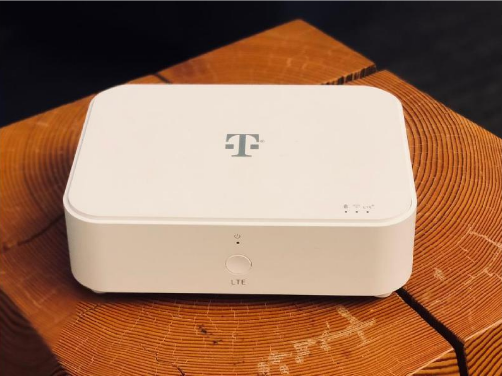
T-Mobile’s 4G LTE in-home broadband router.
As T-Mobile and Sprint continue to pursue regulatory approval of their proposed $26 billion merger, T-Mobile outlined more details about the combined company’s plans for in-home fixed wireless broadband service if the deal gets the greenlight.
The nation’s third and fourth largest wireless providers have promised to disrupt the home broadband industry, and a new FCC filing said ‘New T-Mobile’s’ fixed wireless home broadband service would provide average speeds greater than 100 Mbps to 90 percent of the population by 2024. T-Mobile says the service can be deployed “at nominal or low incremental cost,” by leveraging assets and unused capacity from its mobile 5G deployment.
To start the effort, T-Mobile CEO John Legere in a blog post said the operator will “soon begin” a pilot of the home internet service using a 4G router connected to T-Mobile’s LTE network. Following the merger, the router will be upgraded to include 2.5 GHz spectrum and 5G-capable hardware.
According to the filing, the router will also include mesh network capabilities for advanced WiFi. Cost of the LTE and 5G router was redacted, but T-Mobile said it will provide them at no additional cost to customers and it will be a self-installation process.
Pricing for the service was redacted, but T-Mobile said it can “aggressively capture share” by undercutting what broadband providers typically charge today. The New T-Mobile expects to have 9.5 million subscribers in 2024, but that figure is “just the tip of the iceberg,” according to the filing.
Coverage maps and figures of eligible households for the 5G home broadband service were also redacted, but the filing indicates the service will be available to more than half of the country’s households by 2024. In addition to disruption of the home broadband industry, T-Mobile has promised the merger and resulting service will make a significant impact on closing the digital divide and bringing high-speed internet to many rural Americans that lack service or choice.
According to the filing, mobile traffic in many of the deployment areas would not put much strain on the combined company’s 2.5 GHz spectrum, leaving it available for fixed wireless broadband service.
In T-Mobile’s analysis, introduction of the service will result in consumer benefits between $5 billion and $11 billion in 2024 and benefit the New T-Mobile’s other segments.
“The Home Internet service has a low cost structure and good economics. By monetizing available spectrum and leveraging off of other deployed network assets, the in-home service will be profitable on its own,” T-Mobile said in the filing. The home internet service will also reduce wireless churn, attract new customers, and “complement and create increased revenue opportunities for New T-Mobile’s video distribution service.”
T-Mobile said the fixed wireless home broadband service will be bundled with a video offering from T-Mobile’s Layer3 TV, offering 275 HD channels.
However, if the deal is not approved the filing shows that T-Mobile will likely not move forward with in- broadband service, saying as a standalone the company “has limited plans at best.”
The latest filing comes as the House Judiciary Committee prepares to hold a hearing March 12 to examine the impact of the T-Mobile/Sprint tie up on “consumers, workers, and the internet.”
Last week, 37 members of the U.S. House of Representatives penned a letter to the FCC Chairman Ajit Pai and DOJ head Makan Delrahim, expressing opposition to the merger because it would reduce jobs and drive up prices.
The FCC has paused its informal 180-day “shot clock” review to take public comment on the new information and analysis about the deal. Comments are due by March 28.




